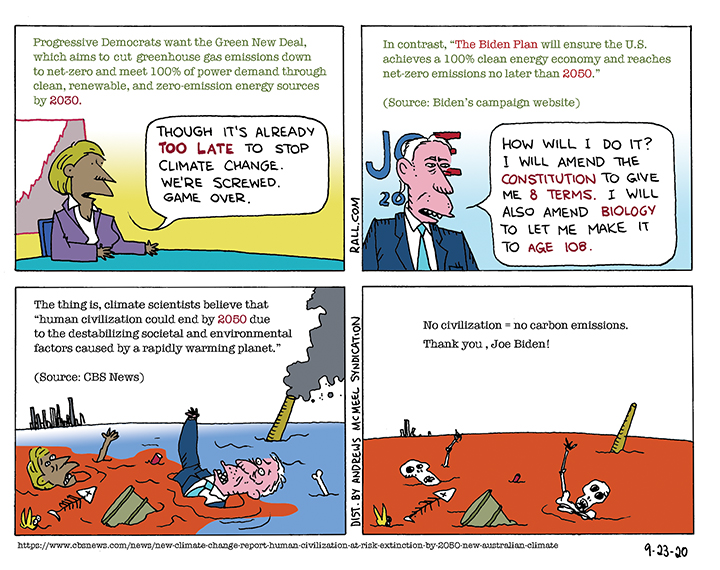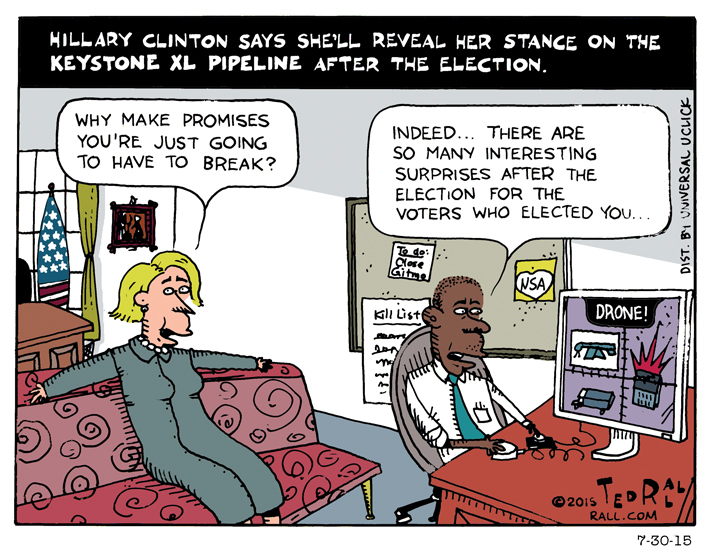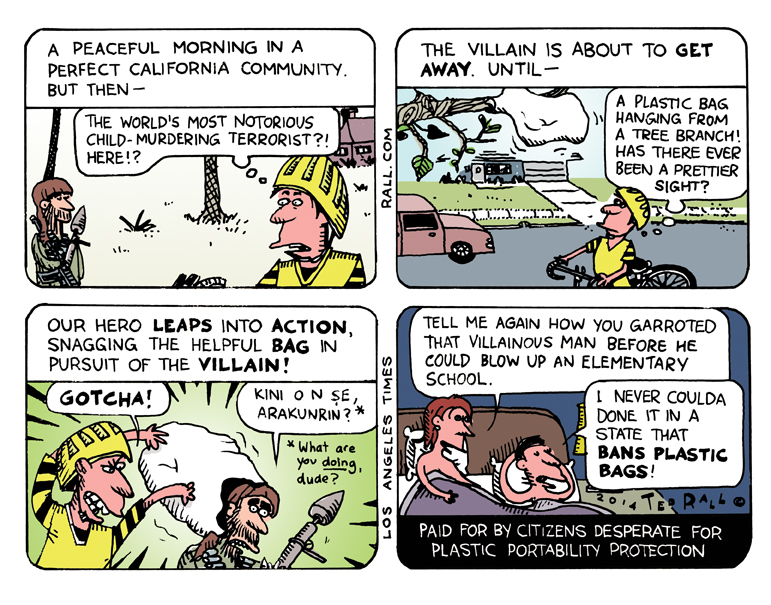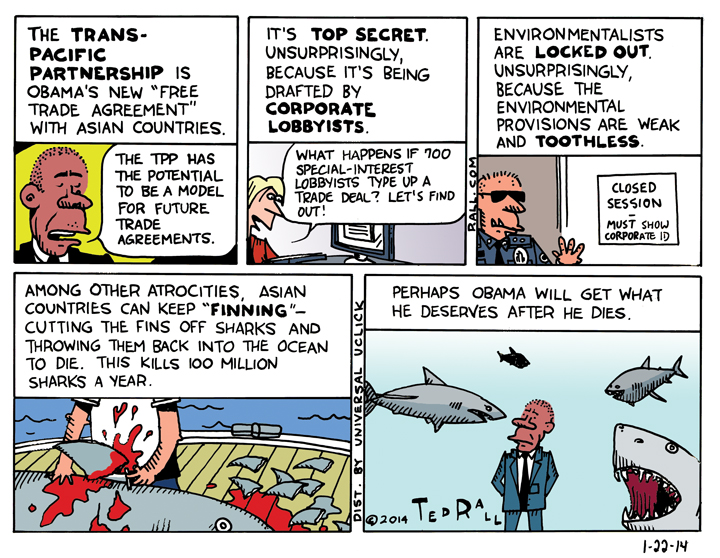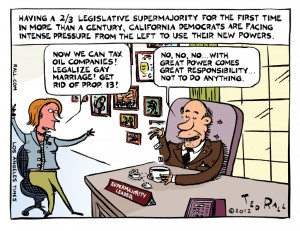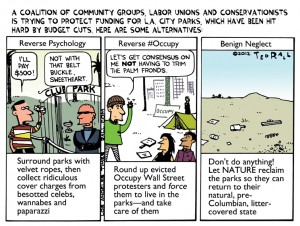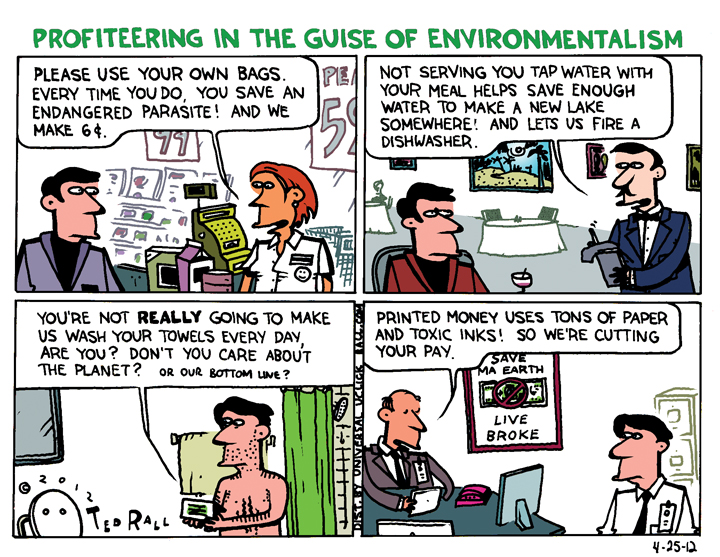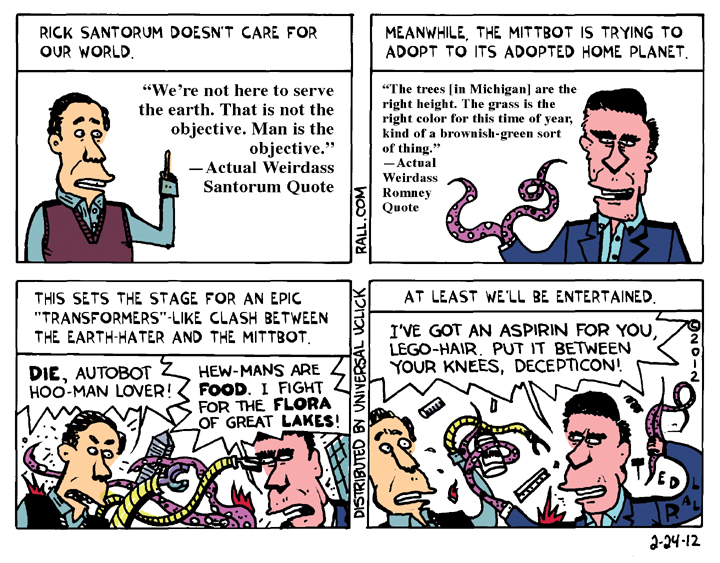Although Joe Biden’s website hat-tips the Green New Deal, he is opposed to it. Instead, he wants to achieve zero greenhouse gas emissions by 2050. The problem is, scientists project the end of human civilization by 2050. So it’s a moot point. The environment is pass-fail. Incrementalism is doomed.
LOS ANGELES TIMES CARTOON: We’ll Miss Those California Flowers
I draw cartoons for The Los Angeles Times about issues related to California and the Southland (metro Los Angeles).
This week:
It looks to be the end of the plastic grocery bag as we know it.
The state assembly appears to have struck a deal in which Californians would pay at least a dime for each recycled paper or reusable plastic bag they get at the grocery store. The currently-ubiquitous single-use plastic bags that have bedeviled litter-control types and environmentalists would be prohibited. That’s a lot of bags. Californians use an estimated 12 billion single-use plastic bags each year.
Plants that manufacture single-use bags would be retooled into recycling facilities, preventing job losses.
Given how hard opponents of a ban have fought over the years, it seemed wrong to this perverse cartoonist not to consider that something (aside from growing the massive plastic trash island in the Pacific Ocean) may be lost. But what?
Following the lead of dark surrealism master director David Lynch, I drank lots and lots of coffee to get my idea juices flowing. This is what I came up with: the plastic bag as weapon.
In self-defense class, they taught me that a folded newspaper can be a surprisingly potent tool for fending off an assailant. (No word yet on whether an iPad can knock a ruffian unconscious.) So can a trash can. What appeals about these strategies is the fact that they’re ubiquitous. Like — you remember the previous use of that word in this little essay — plastic bags. They’re everywhere, hanging from trees! In Africa, people ironically nickname them “African flowers.” What if a “California flower” could be called into service by law-abiding citizens?
Yep. That’s all I got.
Lynch must have drunk more coffee than me.
What He Deserves
Under the Trans-Pacific Partnership, Obama’s new trade agreement with Asian countries, environmental regulations would be weakened even more than they were under George W. Bush. The agreement is top secret, but thanks to WikiLeaks we know that, among other atrocities, the practice of “finning” — cutting the fins off sharks and tossing them back into the ocean to die — would be allowed to continue.
LOS ANGELES TIMES CARTOON: Supermajority
I draw cartoons for The Los Angeles Times about issues related to California and the Southland (metro Los Angeles).
This week: Having won a two-thirds supermajority in the Legislature for the first time in more than a century, California Democrats are now facing intense pressure from the left as they prepare for next year’s legislative session.
Los Angeles Times Cartoon: Save the Parks
I draw cartoons for The Los Angeles Times about issues related to California and the Southland (metro Los Angeles).
This week: A coalition of community groups, labor unions and conservationists is trying to protect funding for Los Angeles city parks, which have been hit hard by budget cuts. Here are some alternatives.
Los Angeles Times Cartoon: The Great Hunter
I draw a weekly editorial cartoon for The Los Angeles Times. With a little luck—and a bigger budget for hiring—this might turn into a staff cartooning job where I’d be doing work about Los Angeles and California throughout the week. If you’re an LA Times reader and you’d like to see me do more work for them, please let them know!
Here is this week’s offering: California Fish and Game President Daniel W. Richards shot and ate a mountain lion in Idaho, where it’s legal. Where will he go next?
SYNDICATED COLUMN: Quit Whining About Student Loans
Time for #OWS to Broaden Its Appeal
It has been 30 days since Occupy Wall Street began. The movement hasn’t shaken the world à la John Reed—not yet—but at one thousand occupations and counting, it can’t be ignored.
OWS has become so impressive, so fast, that it’s easy to forget its half-assed origin. No matter. The fact that the French Revolution was partly set off by the drunken ravings of the Marquis de Sade hardly reduces its importance.
Soon the Occupiers will have to face down a number of practical challenges. Like weather. Winter is coming. Unless they move indoors, campers at Occupy Minneapolis and Occupy Chicago will suffer attrition. But indoor space is private property. So confrontation with the police seems inevitable.
As I saw at STM/Occupy DC, there is an ideological split between revolutionaries and reformists. Typical of the reformists: This week OWSers urged sympathizers to close their accounts with big banks like Citibank and Bank of America and move their savings to credit unions and local savings and loans. If revolutionaries get their way, there will be no banks. Or one, owned by the people.
There is no immediate rush, nor should there be, to issue demands. The horizontal democracy format of the Occupy movement’s General Assemblies is less about getting things done than giving voices to the voiceless. For most citizens, who have been shut out of politics by the fake two-party democracy and the corporate media, simply talking and being heard is an act of liberation. At some point down the road, however, the movement will come to a big ideological fork: do they try to fix the system? Or tear it down?
The Occupiers don’t have to choose between reformism and revolution right away—but they can’t wait too long. You can’t make coherent demands until you can frame them into a consistent narrative. What you ultimately want determines what you ask for in the time being—and how you ask for it.
Trotsky argued for the issuance of “transitional demands” in order to expose the uncompromising, unjust and oppressive nature of the regime. Once again, an “epoch of progressive capitalism” (reformism, the New Deal, Great Society, etc.) has ended in the United States and the West. Thus “every serious demand of the proletariat” de facto goes further than what the capitalist class and its bourgeois state can concede. Transitional demands would be a logical starting point for an Occupy movement with a long-term revolutionary strategy.
Both routes entail risk. If the Occupiers choose the bold path of revolution, they will alienate moderates and liberals. The state will become more repressive.
On the other hand, reformism is naïve. The system is plainly broken beyond repair. Trying to push for legislation and working with establishment progressives will inevitably lead to cooption, absorption by big-money Democrats and their liberal allies, and irrelevance. (Just like what happened to the Tea Party, a populist movement subsumed into the GOP.)
Revolution means violence in the streets. Reform means failure, and the continued, slow-grinding violence by the corporate state: poverty, repression, injustice.
At this point, job one for the movement is to grow.
I don’t mean more Facebook pages or adding more cities. The day-to-day occupations on the ground need to get bigger, fast. The bigger the occupations, the harder they will be for the police to dislodge with violent tactics.
More than 42 percent of Americans do not work. Not even part-time. Tens of millions of people, with free time and nothing better to do, are watching the news about the Occupy movement. They aren’t yet participating. The Occupiers must convince many of these non-participants to join them.
Why aren’t more unemployed, underemployed, uninsured and generally screwed-over Americans joining the Occupy movement? The Los Angeles Times quoted Jeff Yeargain, who watched “with apparent contempt” 500 members of Occupy Orange County marching in Irvine. “They just want something for nothing,” Yeargain said.
I’m not surprised some people feel that way. Americans have a strong independent streak. We value self-reliance.
Still, there is something the protesters can and must do. They should make it clear that they aren’t just fighting for themselves. That they are fighting for EVERYONE in “the 99 percent” who aren’t represented by the two major parties and their compliant media.
OWSers must broaden their appeal.
Many of the Occupiers are in their 20s. The media often quotes them complaining about their student loans. They’re right to be angry. Young people were told they couldn’t get a job without a college degree; they were told they couldn’t get a degree without going into debt. Now there are no jobs, yet they still have to pay. They can’t even get out of them by declaring bankruptcy. They were lied to.
But it’s not about them. It’s about us.
The big point is: Education is a basic right.
Here is an example of how OWSers could broaden their appeal on one issue. Rather than complain about their own student loans, they ought to demand that everyone who ever took out and repaid a student loan get a rebate. Because it’s not just Gen Y who got hosed by America’s for-profit system of higher education. So did Gen X and the Boomers.
No one will support a movement of the selfish and self-interested.
The Freedom Riders won nobility points because they were white people willing to risk murder to fight for black people. Occupiers: stop whining about the fact that you can’t find a job. Fight for everyone’s right to earn a living.
The Occupy movement will expand when it appeals to tens of millions of ordinary people sitting in homes for which they can’t pay the rent or the mortgage. People with no jobs. Occupy needs those men and women to look at the Occupiers on TV and think to themselves: “They’re fighting for ME. Unless I join them, they might fail.”
The most pressing issues for most Americans are (the lack of) jobs, the (crappy) economy and growing income inequality. The foreclosure and eviction crisis is also huge. OWS has addressed these issues. But OWS has not yet made the case to the folks watching on TV that they’re focused like a laser.
It takes time to create jobs. But the jobless need help now. The Occupy movement should demand immediate government payments to the un- and underemployed. All foreclosures are immoral; all of them ruin neighborhoods. The Occupy movement should demand that everyone—not just victims of illegal foreclosures—be allowed back into their former homes, or given new ones.
For the first time in 40 years, we have the chance to change everything. To end gangster capitalism. To jail the corporate and political criminals who have ruined our lives. To save what’s left of our planet.
The movement must grow.
Nothing matters more.
(Ted Rall is the author of “The Anti-American Manifesto.” His website is tedrall.com.)
COPYRIGHT 2011 TED RALL

